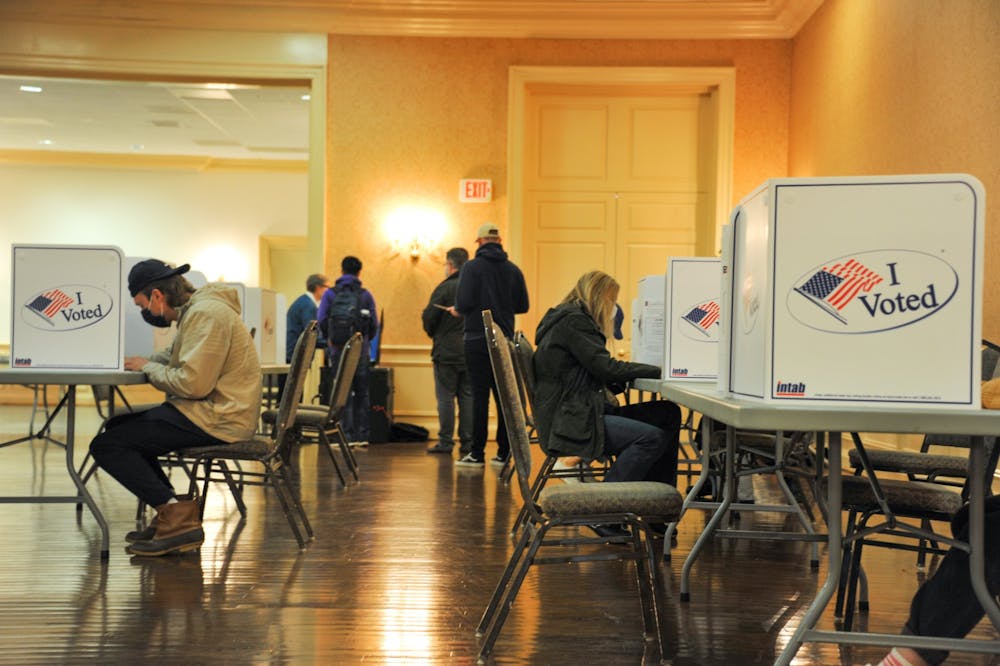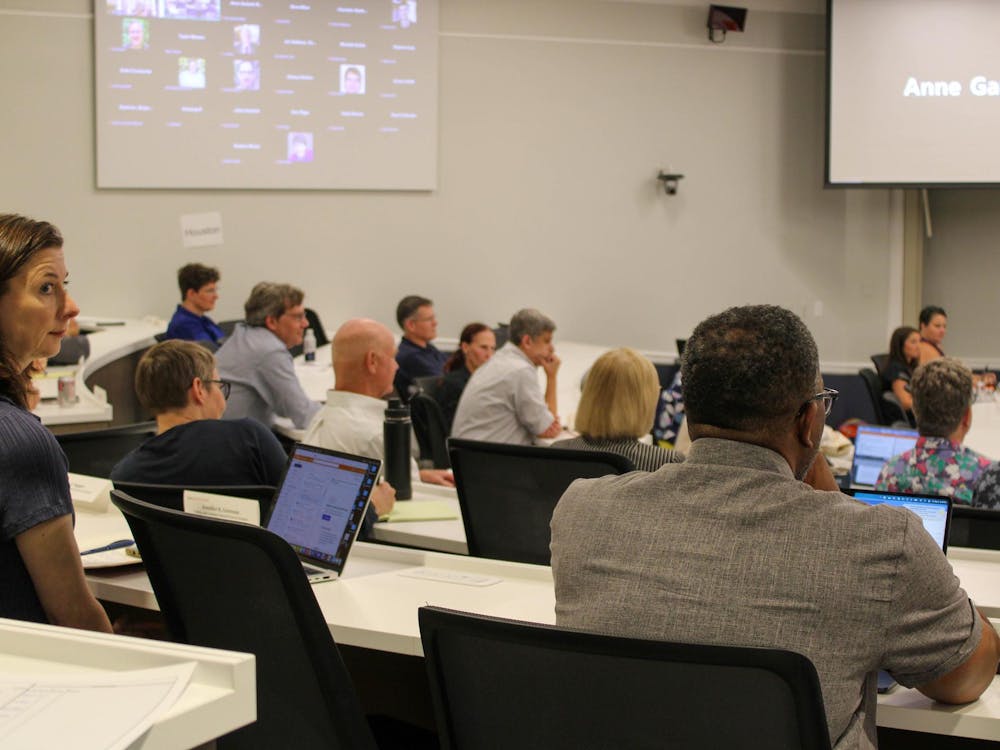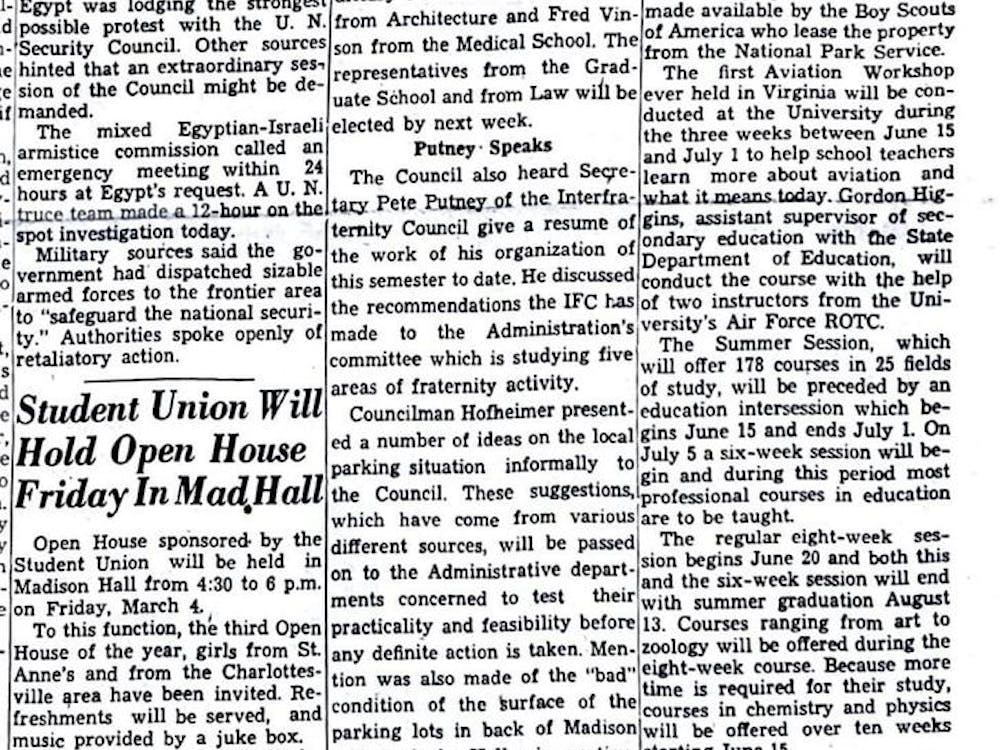Republican Glenn Youngkin was elected Governor of Virginia on Election Night, beating out Democratic nominee Terry McAuliffe, who previously served as governor from 2013 to 2017. Incumbent Democrat Sally Hudson was also reelected to represent the 57th District in the Virginia House of Delegates and Democrats Juandiego Wade and Brian Pinkston were elected to serve on Charlottesville’s City Council.
McAuliffe and Youngkin faced off in a race defined by the candidates’ perspectives on education, the COVID-19 pandemic and abortion. McAuliffe characterized his opponent as a “wannabe Trump,” and both candidates attempted to cast each other as extremists.
Article V of Virginia’s constitution prevents consecutive terms, meaning that McAuliffe was unable to run for reelection after his term ended. Virginia is also one of the only states that selects its governor in an off-year election. For the previous two years, Democrats have had control of the General Assembly.
The outcome of the gubernatorial race has been predicted to serve as a referendum on President Joe Biden’s presidency and as an indicator for the 2022 midterm elections, when 34 of the 100 seats in the Senate and all 435 seats in the House of Representatives will be up for grabs.
By midnight, the Associated Press and statewide and national outlets showed Youngkin in the lead with 51 percent of the vote compared to McAuliffe’s 48 percent, with over 95 percent of precincts reporting. In Charlottesville, McAuliffe won 83 percent of the vote.
“We still got a lot of vote to count, we have about 18 percent of the vote out, we're going to continue to count the votes because every single Virginian deserves to have their vote counted,” McAuliffe told supporters at a campaign event around 10 p.m.
Youngkin, meanwhile, exceeded his projected vote count by 9 p.m., outperforming previous Republicans in traditionally red counties in Virginia.
In addition to casting votes for governor, students voted for a new lieutenant governor between Democrat Hala Ayala and Republican Winsome Sears, attorney general between Democrat Mark Herring and Republican Jason Miyares, House of Delegates member and local officers in Charlottesville and Albemarle.
Hudson was reelected to represent the 57th district in the Virginia House of Delegates with 77 percent of the vote. A professor in the Batten School of Public Policy and Leadership, Hudson was first elected in 2019 and ran against Republican Phillip Hamilton. This year, some of Hudson’s priorities include universal pre-k, the legalization of marijuana and meeting the challenges of climate change.
In Charlottesville, Wade and Pinkston beat Independent Ariel Washington to win seats on City Council. Wade garnered 11,582 votes — or 42.5 percent of voters — and Pinkston received 10,041 votes, or 36.9 percent. Wade has said he aims to address problems within the criminal justice system, while Pinkston has expressed the importance of responding to climate change.
Students took to the polls Tuesday to exercise their civic duty in a gubernatorial election that gained national attention as a preview of the 2022 midterms to come next year.
Many students drove, walked or carpooled with friends to their polling locations.
Polls opened at 6 a.m. and closed at 7 p.m. across the state. Students living on Grounds voted at a variety of locations including Slaughter Recreation Center, Alumni Hall, Johnson Elementary School and Buford Middle School.
According to the Center for Politics website, the University offered free transportation to students to the Buford and Johnson precincts, with pickup from 8:00 a.m. to 6:30 p.m. in front of Thornton Hall. Student Council also offered round-trip reimbursements for 200 students using Uber or Lyft to get to their polling location on a first-come, first-serve basis.
Data shared by the City of Charlottesville’s Voter Registration and Elections Office showed that by 4 p.m., voter turnout in Charlottesville had surpassed 2017 levels. At 4 p.m., the City recorded a turnout of 8,148 voters, or 26.4 percent of active registered voters. These numbers do not include 4,543 voters who cast early in-person ballots. This year marked the first year Virginians could vote via no-excuse early and mail-in voting.
A common theme that emerged among student voters who were at the polls was the importance of making an impact through exercising the right to vote.
“I voted because I believe it's important to do so,” third-year College student Laira Splinter said. “Like the sticker says — I made a difference.”
Upon voting, everyone who voted received a red, white and blue “I Voted” sticker with the above phrase. Fourth-year College student Anna Canning, who voted at Carver Recreation Center, similarly said she voted just because she thinks “it's important for everyone to do.”
Students — particularly first-time voters — also expressed excitement regarding the potential impacts of their votes on the election.
“Now that I can, I should exercise that right [to vote],” said first-year College student Carley Frajda, a first-time voter.
First-year College student Schuyler Moore said that her experience voting at Slaughter was smooth.
“It was exciting for me personally as a first-time voter, and voting in — what is in my perspective — a swing state,” Moore said.
The state of Virginia has voted for the Democratic Party for the past three presidential elections — state has not elected a Republican in a statewide election since 2009, when Republican Bob McDonnell defeated Democrat Creigh Deeds in the gubernatorial race.
Both sides of the political spectrum had representatives present at the polls, setting up tents outside of various voting locations. University Democrats set up in front of Slaughter, offering voters cookies and candy in addition to sample Democrat ballots.
College Republicans stationed a tent at Alumni Hall. Libby Klinger, president of College Republicans and third-year College student, said the group was there to “educate voters about the Republican candidates on the ballot.”
“We provide them a sample ballot in case they want to look at the candidates that the Republican Party is supporting,” Klinger said. “We just thank everybody for voting who stopped by even if they don't take one of our ballots or sample ballots or anything.”
Many upperclassmen living off-Grounds near the Corner voted at Venable Elementary School, where Ben Life, member of University Democrats and second-year College student, said the group saw a pretty “good stream [of] voters” as of 3 p.m.
Beside the University Democrats table at Venable Elementary School were students with the Republican Party of Charlottesville passing out Republican signs and offering Republican sample ballots. Third-year Engineering student Bronte Sundtrom said the group reached out to Young Americans for Freedom at U.Va., who solicited individuals to volunteer on Election Day. According to its constitution, YAF cannot endorse public candidates, so volunteers were not representing the organization.
Many students came to the polls in order to make their voices heard in local politics and generate change.
“It’s a way to express your political views and have an impact on the political proceedings,” first-year College student Natasha Swindle said.
Third-year Batten student Emmy Deignan said she voted because she’s “not a fan of Youngkin, and … McAuliffe’s okay.”
While the focus of national attention was largely on the gubernatorial race, some students, such as Jack Wiler, a fourth-year Engineering student, expressed what he saw as the importance of local elections, referring to the Albemarle and Charlottesville School Board and Charlottesville City Council races.
“I think that's really important to make sure that you're informed and that you are supporting that government because those people have a real positive impact on the community,” Wiler said.
Polls closed at 7 p.m.







